LSA hosts 3rd annual BIM and Digital Transformation Symposium
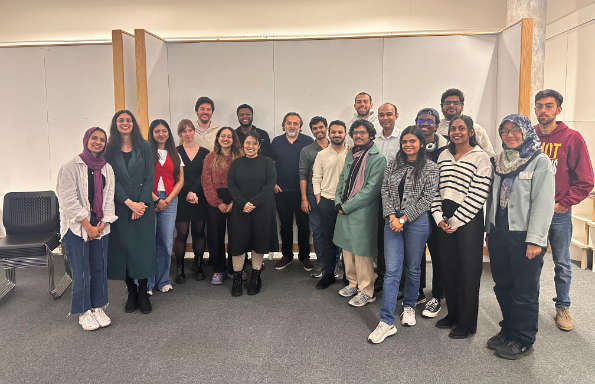
This year we organised the 3rd annual BIM and Digital Transformation Spring Symposium (BIM DigiTSS) 2025, held at the Reilly, School of Architecture on Thursday and Friday, 20–21 March 2025, and chaired by Dr Adonis Haidar, a senior lecturer and the programme director of the MSc BIM and Digital Transformation programme at Liverpool School of Architecture
The symposium focused on digitalisation across the AEC (Architectural, Engineering, and Construction) industry—including BIM implementation, computational design, and digital construction. A special highlight this year was Day 1’s focus on digital heritage, showcasing how BIM and digital tools support heritage conservation and management.
We welcomed a diverse group of presenters: researchers and industry practitioners specialised in BIM and Digital Transformation featured on Day 1, and on Day 2, alumni of the BIM DT programme presented their theses, shared how they are applying their learning in practice, and reflected on their journeys since graduating.
We extend our heartfelt thanks to all our speakers for their insightful presentations, which truly reflect their deep involvement in both research and practice.
BIM DigiTSS 2025: Speaker Highlights
The two-day symposium brought together a dynamic range of speakers from academia, industry, and cultural heritage sectors, each contributing unique insights into digital transformation in the built environment.
On Day 1, the focus was on digital heritage and cultural preservation. The day opened with a keynote from Abdullah Halawa, Manager of Policy Projects and Studies at ICCROM, who explored the theme “Earthen Heritage: Reviving Traditional Knowledge for Sustainable Futures.”
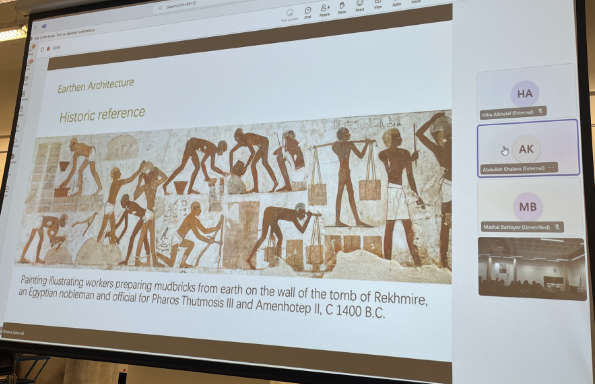
He was followed by Mashal Battoyor, a PhD candidate at the University of York and former BIM-DT student, who reflected on his academic journey in a talk titled “From Confusion to Clarity: Navigating a BIM-DT Thesis Journey (BIM and Sustainable Heritage).”
After lunch, Dr Hiba Alkhalaf, Associate Researcher at King’s College London, addressed the challenges of “Documenting Cultural Heritage in Times of Conflict.” This was followed by Oceane Durand-Maniclas, a PhD researcher at the University of Zurich and BIM-DT alumna, who discussed “Material Reuse in Heritage Conservation: A Digital Design-to-Production Circular Workflow.”
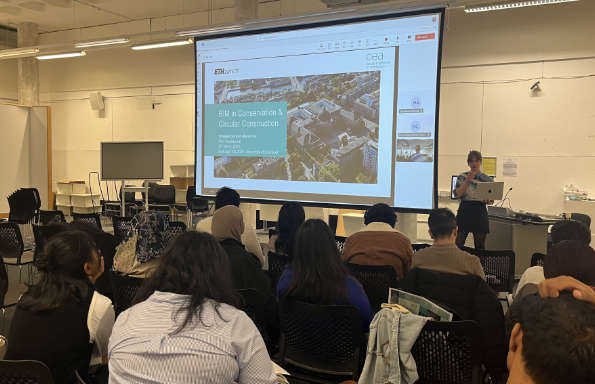
The day concluded with a keynote from Marco Bonelli, Vice President of Digital Delivery at Sektor.Build, on “Digital Innovation in the Construction Industry.”
Day 2 shifted the focus toward practice-led research and digital implementation. Neha Sudhir Nalavde, a recent BIM-DT graduate, opened the day with a talk on overcoming barriers in additive manufacturing for construction. She was followed by Ali Ayad Alwindawi, BIM Coordinator at Manhal Habbobi Consultants, who presented his framework for BIM implementation for sustainable buildings in Iraq. Next, Negin Mirghashini, currently a Graduate Designer at MAC Roofing & Contracting Ltd, explored the integration of BIM and IoT for sustainability outcomes.
After lunch, Daniel Stephen presented a rule-based hierarchy to aid decision-making in ACC of building models. Vipin Krishna Das, Digital Construction Coordinator at Sir Robert McAlpine, shared his research on using BIM for robotic timber frame assembly.
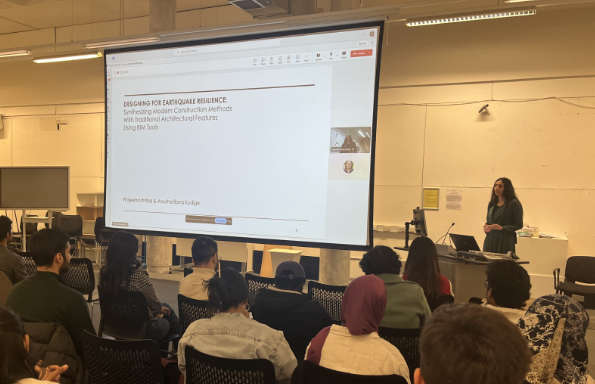
Wajeeha Imtiaz, founder of The Eastern Grid, showcased her work on earthquake resilience by blending traditional architecture with modern BIM tools.
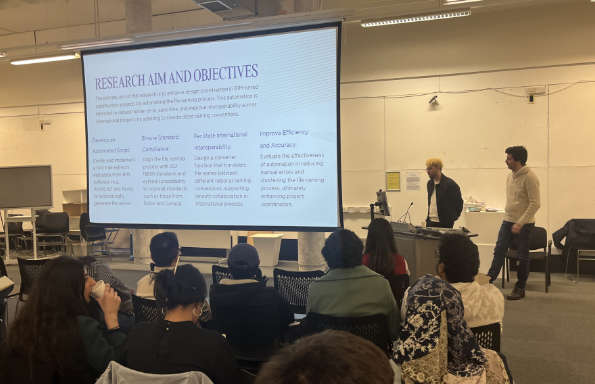
Later, Arshia Olfat and Ismail Boray Dogan co-presented their research on automating 3D model naming conventions in design coordination. The symposium concluded with Yazeed Alshiddi, PhD candidate at UoL, presenting a BIM-based framework to enhance communication in Saudi architectural firms. The final session was marked by the BIM League awards ceremony celebrating student innovation and contribution.